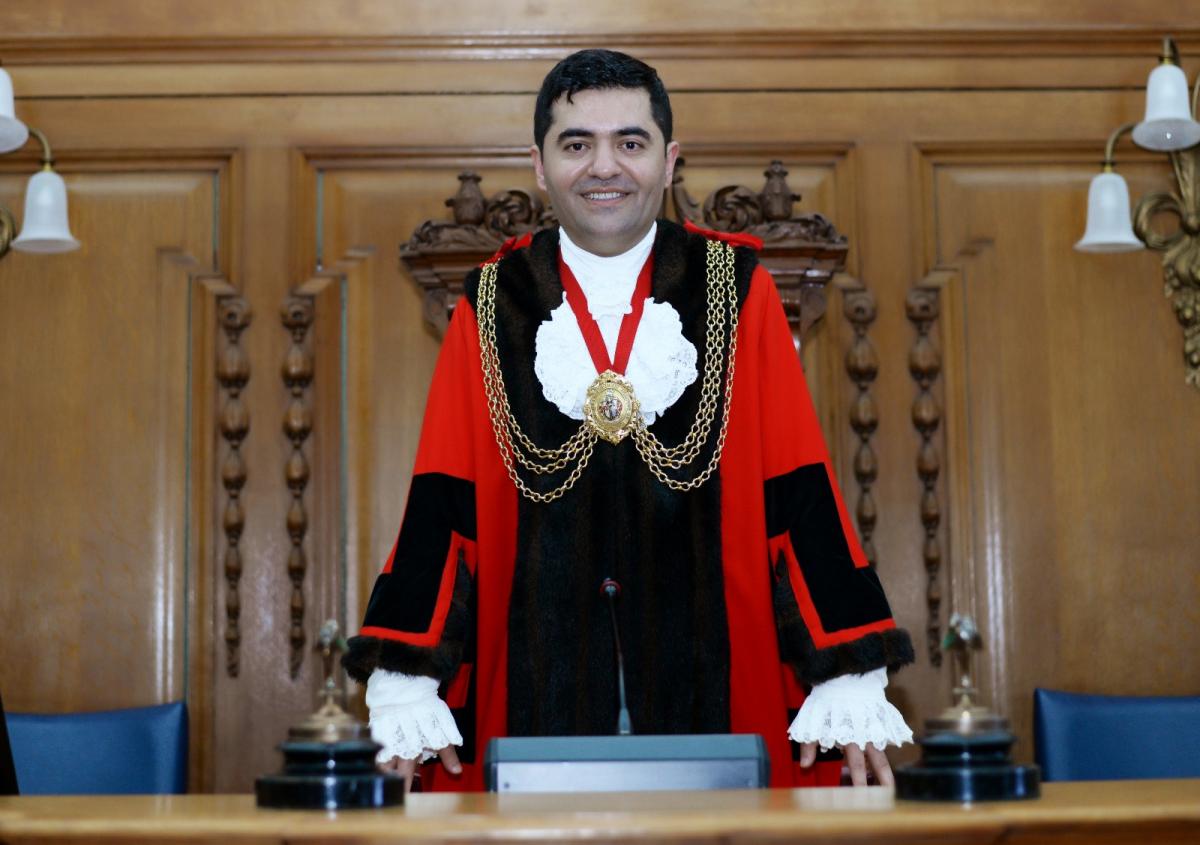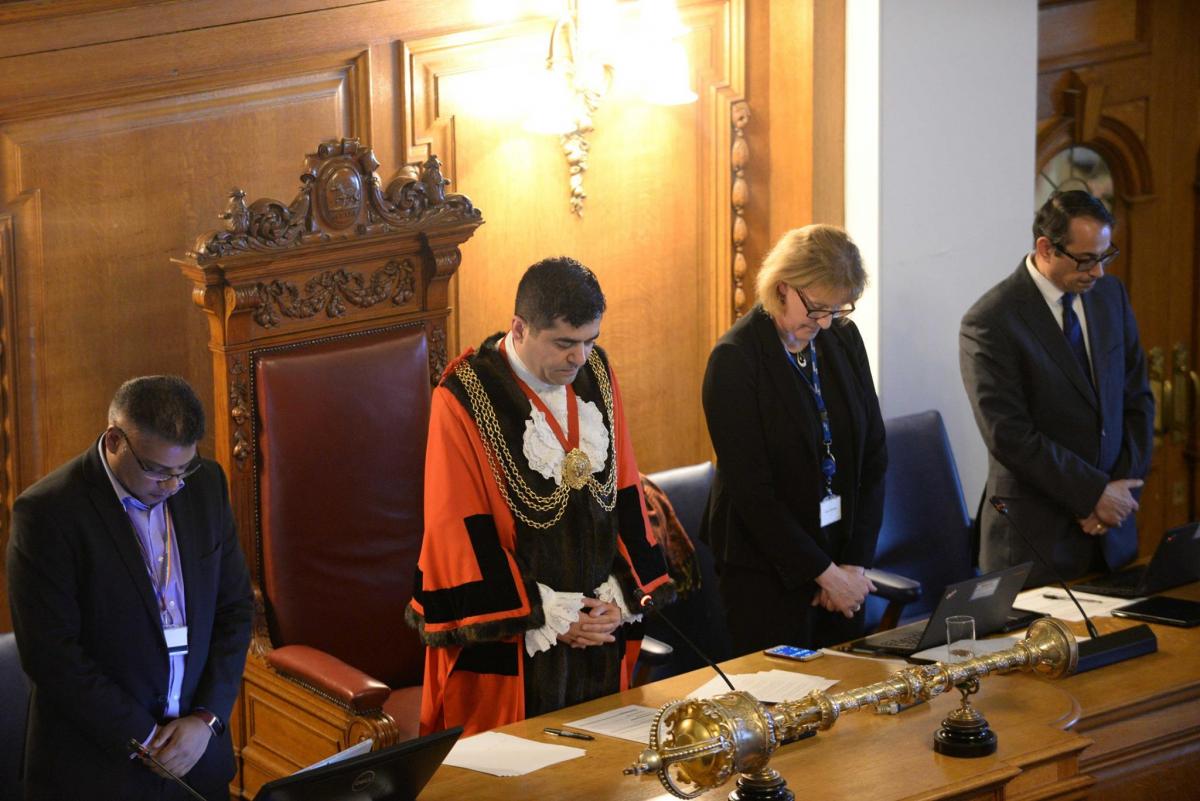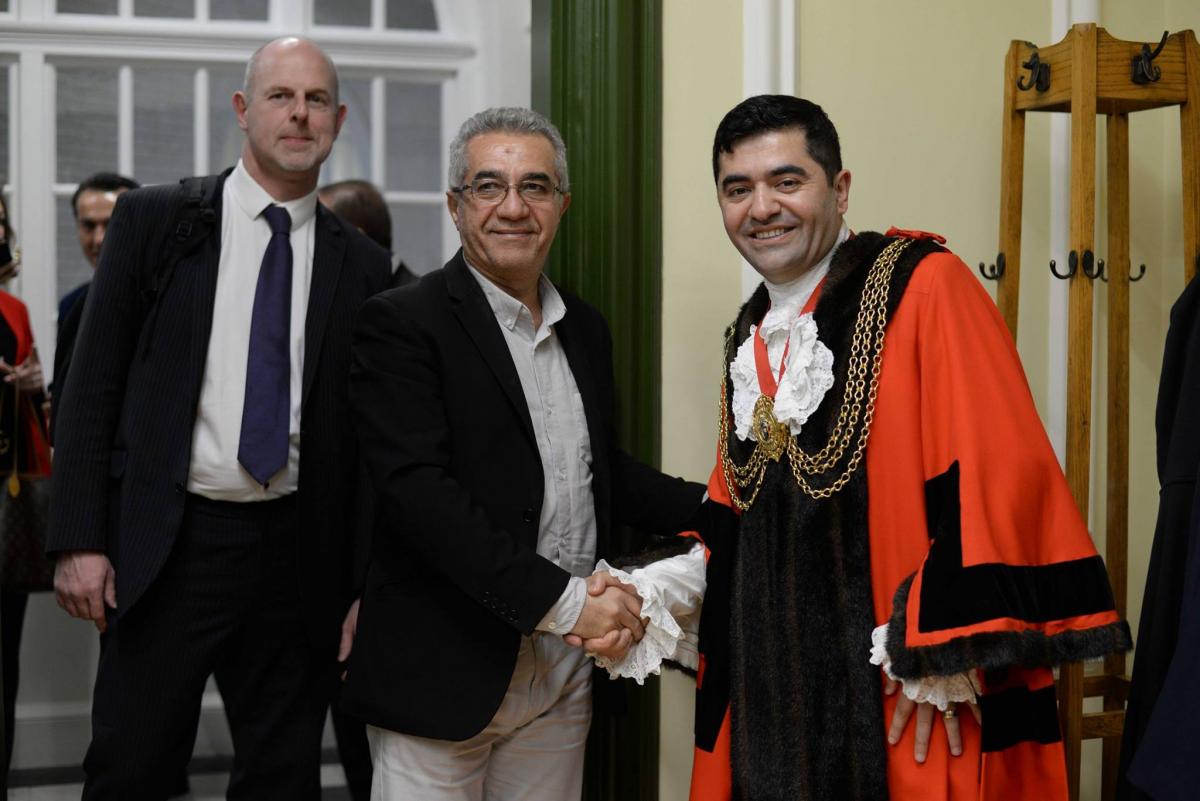Q: How do you intend to promote Lambeth during your time as mayor?
A: Lambeth is a brilliant borough in London with great institutions from the National Theater to Southbank Center, from the Royal Festival Hall to the Queen Elizabeth Hall; great landmarks such as the London Eye is based in our borough, great districts such as Brixton, Kennington and Streatham are all based in Lambeth. With all this in mind, Lambeth is already a high profile borough, and like the rest of London’s boroughs, it has a lot to offer to a wide array of communities. As such, Lambeth does need much in terms of promotion, but as the mayor for the next year, I will continue to do my best to attract more communities, more people, and more businesses to Lambeth.
Q: What do you intend to accomplish by the end of your term as mayor?
A: The theme I have chosen for this year is about refugees and immigration, so I want to promote immigrant communities and make sure that more and more people start to realize how important it is for people to come into a new country and start a new life and the challenges that come with such a prospect. It is also important to help people recognize the contributions these communities have made to Lambeth and the wider United Kingdom. I will be working hard with my team and I will be working separately with two different charities to spread this message, one of the charities is called the Migration Museum and the other is called Lambeth Welcomes Refugees. These two charities will be my mayoral charities for my term and together we will be highlighting the contributions of migrant communities to Lambeth as well as the wider UK.

Q: It seems that your identity as a migrant to the UK has influenced both your career and life as a whole; do you believe that Britain is still a welcoming nation three years on from the Brexit referendum result and the confusion that has followed it?
A: I was born into a Kurdish refugee family from Turkey which arrived in Britain in 1994. Britain has always had an issue surrounding immigration. But, Britain is a welcoming country, British society is a very welcoming society that is tolerant towards diversity and different cultures and will continue to be so for the coming years. Brexit has created divisions and tension in our communities, but I think that in the near future, once the Brexit issue is resolved, the nation will come together and reunite as a community again.
Q: During your last interview with Majalla, you were standing for parliament do you intend to do so again after your mayoral term or during the next general election, whenever that may be?
A: There is a strong chance that I will run for parliament again, once we know when the next election is going to be, once we know what might be available, then I might consider running. But, it is very likely that I will once again stand for parliament.
Q: The Labor party is currently split over the prospect over a second referendum. Would you be open to backing a second vote?
A: As a mayor, I must be politically neutral on such issues and cannot comment on such a prospect. But, as a Labor councilor working here in Lambeth, I was a remain supporter who voted to remain within the EU. As such, I would not be opposed to a confirmatory vote on the final deal on Brexit and if that entails a second referendum, then so be it.
Q: Jeremy Corbyn’s leadership of the Labor Party has been divisive and has caused party MPs and members to quit the party, do you think his continued leadership will do more harm than good for the party?
A: As a Labor councilor, I think any party with new leadership will face a number of issues. I remember when Tony Blair became the new leader and lots of issues within the party arose which subsequently caused a lot of members to quit the party. The same can be said when Gordon Brown and Ed Miliband became leaders of Labor, the problems surrounding leadership of political parties is not new. Labor party is a broad church and under Jeremy Corbyn’s leadership, things will get better for the wider Labor movement.
Q: You joined the Labor Party just as Blair became its leader. As you know, during his tenure Blair shifted the party to become more centrist, do you think Corbyn’s attempts to reshift the party back to the left is beneficial?
A: The needs of the communities and the country are changing; the center of politics is changing gradually. The center in politics now may not be the center of politics in ten years’ time. Things will change because the British public is always changing. What we offered in the last Labor manifesto was greatly received by the British public and Labor did really well in the elections, while commentators were expecting us to lose seats we actually gained seats, so I think what we are doing now is greatly serving the British public.
Q: Tell me more about the organizations that you run?
A: I run several different organizations, one of them is a think tank called the Center for Turkish Studies which does a lot of work in Turkey and the UK. Another think tank I run is the Center for Kurdish Progress which does work on Iraq, Iran, Syria, and the UK and most of its work focuses on Kurdish issues.
Both organizations are quite active as they hold conferences, seminars, panels, networking events. Since these organizations are cross-party organizations, we work closely with all political parties. As such, we worked with Tory members, Labor members, SNP members, Lib-Dem members, Green members…etc. The reason for this is because the organizations focus on communal issues within the Middle East and Turkey, so we work really hard to cooperate with people from across the political spectrum.
Q: Will these organizations come into play during your term as mayor?
A: No, even though they’re based in Lambeth they don’t have anything to do with local issues, but rather international politics. As such, they won’t have a role during my mayoral term.
Q: Can you tell me any Labor policies or manifestos which try to alleviate the tensions between the migrant communities and the wider British community?
A: As a Labor councilor, I can tell you that Labor is the party of equality and tolerance. Labor has always worked with migrant communities and refugee communities within the UK. Under Labor governments, migrant and refugee communities have always been supported well in terms of settling and integrating and their issues have always been addressed by the government.
The Tory government’s austerity policies have made things difficult for all communities but in particular for migrant communities, which have also caused an increase in far-right activism. While Brexit didn’t directly cause this rise of the far right, we did start to see a surge in far right after the Brexit vote. Today, there is an increase in racist attacks on migrant communities and religious minorities in the UK, which is a great danger. Any government, regardless of its party, should work to stop such attacks from happening.

Q: There are commentators who argue that there is a problem of migrant communities not integrating within wider society and instead opt to live within their own communities under their own cultural rules and norms. What do you say to that?
A: As a Labor councilor I can say that migrant communities are law abiding citizens and they work really hard to engage and interact with mainstream communities and integrate. So, if integration is taking a slower pace than expected, then the government needs to provide the facilities to speed it up. It’s easier to blame the migrant communities and refugee communities and tell them that they are not integrating properly. So what does proper integration mean? That needs to be debated and I believe that given the opportunity every single community in the UK will integrate within society. If you are excluding these communities, then they will resort to closing themselves off and protect their own culture, so you cannot really blame them. You need to find a way to help those communities open up and integrate within mainstream society.
Q: You were quite young when you first joined Labor and went into politics, so what inspired you to go into politics in the first place?
A: Simply put, the people in the Labor party were so welcoming to me, a young Kurdish man from a refugee family hailing from Turkey. As such, the Labor Party felt just like home and my fellow party members felt like a big family that you can rely on and be a part of. That’s how I got involved in the Labor party and its politics and its values of equality and tolerance which have attracted me and many people like me.
Q: Do you think many young people today are more engaged or less engaged in politics than the time you first started your political career?
A: Young people are much more engaged than ever, there’s a lot of issues that are directly affecting young people in today’s Britain. Issues regarding young people did not take priority 20 years ago, but today these issues are on a much higher agenda. Moreover, the increasing problems young people face today has encouraged them to be much more involved in politics.
Q: How much political engagement from the youth do you see within your own constituency?
A: In terms of participation in local activities, it’s not bad but it could be better. There are many young people who are members of the local constituency but they are not all actively out on doorsteps campaigning, this needs to be developed further but at the same time, it’s getting much better.
Q: What do you think of Labor’s chances in the upcoming European Parliamentary elections? According to most polls, Labor is second after the Brexit Party.
A: As a Labor councilor, I can say that the debate over Brexit has been divisive both before and after the referendum. The Labor Party has tried really hard to keep both leave voters and remain voters together so that the country can remain united. I think the Labor Party is doing really well in the polls. While some polls have placed the Brexit Party on top, the majority of the polls are putting Labor ahead of all other parties. The real worry here is the Conservative Party, as it is third or fourth in most polls. In spite of the fact that the Conservatives are the government, it’s losing support from most of its grassroots. The upcoming European elections on May 23 could be a precursor for the upcoming general elections, especially if the Labor Party is voted in, the Conservative Party is voted out and the Brexit Party and the Lib-Dems take seats away from the Conservatives.
Q: There is a problem of hardline Brexiters and Remainers who refuse to compromise no matter what, do you think Labor can bring those people together and reconcile between them?
A: As a Labor Councilor, I think Labor is the party that is trying very hard to find common ground, in which jobs will be protected, the economy will be protected, the environment will be protected and workers’ rights will be protected. At the same time, we aim to remain in the single market and customs union so that our country’s businesses will continue to do well. But, it is the government that has negotiated a certain deal with the European Union and the former has shown a lack of willingness to compromise both within parliament and its own party. Hard Brexitors within the Tory Party have refused to negotiate with the government and rather than blaming in party fighting, the government has blamed Labor for its own failures.

Q: Environmental issues have become more important, as evidenced by the recent protests. What has the Lambeth Council done to find a solution to the growing environmental problems?
A: The solution is not an easy solution, but we are one of the pioneer councils that have declared an emergency for the environment. So we are trying very hard in terms of our recycling activities and looking after our own environment. There are prominent Lambeth constituents who have taken part in the environmental demonstrations and the Extinction Rebellion. Our council works very hard with environmental groups to protect our own environment, without our environment there is no future for anyone.
Q: What is your message to those living in Lambeth as their new Mayor?
A: The importance of engagement. All our communities need to engage with our local authorities and our local NGOs, local community organizations, youth groups…etc. People need to engage so that their voices will be heard; together we can all make a real difference in areas where we live. With this spirit of cooperation, we can make Lambeth an even better place to live and work in, the same can be said on every council across the UK and every local community across the world. Everyone needs to engage with their local political, environmental and grassroots groups because only by working together we can make a real difference in our own lives.








